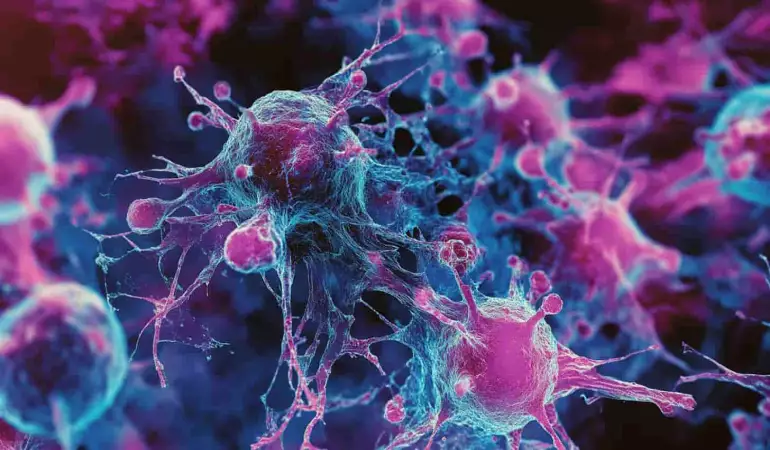Pancreatic cancer 'weak spot' discovered: opens up new treatment options
Scientists have known for some time that interactions between tumors and the nervous system occur in almost every type of cancer they have studied . In many cases, these interactions promote tumor growth and survival, including pancreatic cancer, which is intertwined with a dense network of nerves. But the new discovery offers some promising insights.
February 18, 2025 21:01
There was no clear interaction with cancer cells
Scientists from the German Cancer Research Center (DKFZ) and the Heidelberg Institute for Stem Cell Technology and Experimental Medicine (HI-STEM) have revealed that pancreatic cancer is able to specifically reprogram neurons to its advantage.
Previous studies have shown that blocking nerve function in mice can slow cancer growth and increase the sensitivity of tumor cells to certain chemotherapies and immunotherapies.
However, until now, it was not clear what precise molecular mechanisms determine the interaction of ganglia - the control centers of the peripheral nervous system - with cancer cells.
However, now a team of German scientists has achieved a breakthrough: for the first time, they have managed to analyze nerve cells at the molecular level in both healthy tissues and pancreatic tumors in mice.
The researchers provided a detailed molecular characterization of individual neurons whose gene activity was altered in the tumor.
Increasing the effectiveness of immunotherapy
When scientists surgically cut or destroyed the connections between the sympathetic nervous system and the pancreas with special neurotoxins, tumor growth slowed significantly.
In addition, the activity of growth-promoting genes in cancer cells and tumor-associated fibroblasts (CAFs) decreased. The activity of genes that promote inflammatory processes was significantly increased.
It was this inflammatory response, triggered by the disruption of nerve communication, that activated the immune system. T
This suggested that such an approach could enhance the effects of immunotherapy using so-called checkpoint inhibitors (ICIs).
These drugs “release” the “brakes” of the immune system, but on their own they are usually powerless against pancreatic carcinomas because these tumors are considered immunologically “cold.” This means that T cells important for therapy cannot reach the tumor.
However, when researchers blocked nerve connections to pancreatic tumors in a mouse model using a targeted neurotoxin, the tumors became sensitive to the ICI nivolumab, resulting in tumor mass reductions of up to one-sixth compared to controls.
"By blocking the nerves, we were able to make an immunologically 'cold' tumor sensitive to immunotherapy," said Simon Renders, one of the study's authors.
Synergistic effect with chemotherapy
Meanwhile, completely disrupting the connections between tumor neurons using the drug nab-paclitaxel (a component of standard pancreatic cancer chemotherapy) and a neurotoxin that shuts down sympathetic neurons reduced tumor mass by more than 90 percent.
It is noteworthy that nab-paclitaxel inhibits cell division, but also affects sensory nerves, making peripheral neuropathy one of its more serious side effects.
With repeated cycles of the drug, the number of sensory nerve fibers in the tumors drastically decreased, but they retained the cancer-promoting gene. But that was until the neurotoxin kicked in.
All things considered, this is a significant breakthrough in the never-ending fight against cancer, which kills millions of people every year and has a significant impact on society worldwide. This discovery signals the possibility of promising solutions in the field of cancer treatment.




